Birmingham begins work on new $175 million stadium at the BJCC
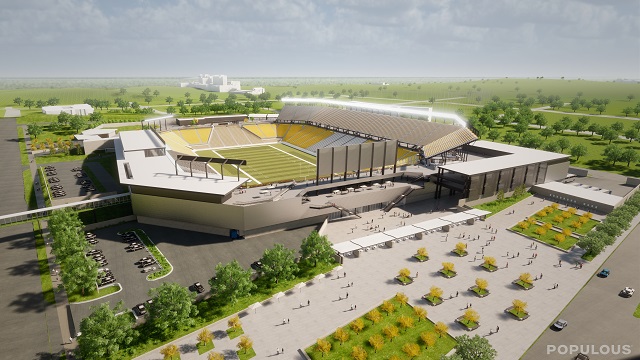
It’s not the first time a groundbreaking has been held for a new stadium next to the Birmingham-Jefferson Convention Complex (BJCC), but officials on Thursday vowed it’s the last one. “This is my third groundbreaking for this facility,” said Valerie Abbott, president of the Birmingham City Council. “This one is going to stick. The reason is because of teamwork.” That teamwork was evident as leadership from Birmingham, Jefferson County, the Alabama Legislature, UAB and corporate leaders joined together to break ground on the $175 million stadium on the east side of the BJCC. Tad Snider, CEO and executive director of the BJCC, said this groundbreaking was different. “We’re actually moving forward this time,” he said. “Yes, it’s a groundbreaking. Yes, we’ve done this before. But it’s the first time money has been in the bank.” The stadium is expected to be completed in time for the opening ceremonies of the World Games in summer 2021. Later that year, UAB will begin playing its home football games in the venue. Other sporting events and entertainment productions are also expected to be held there. “Having a stadium like this is so great for the fans,” said Mark Ingram, UAB athletic director. He said the facility builds on the momentum of the football team winning the Conference USA title this year and helps in recruiting both students and student athletes to UAB. The current design is for a stadium with seating for up to 55,000. Officials said the design will be tweaked up until vertical construction begins. Dr. Ray Watts, president of UAB, said the stadium will have an even bigger role to play for the entire region. “This stadium will be the home stadium for the UAB Blazers but on 350 some-odd other days, it’s going to be a great attribute for the city of Birmingham,” he said. “This is going to be finest facility of its kind in the state of Alabama. And with the renovation of the arena and the entire complex, I, too, believe that this is probably the most important economic development project in the city of Birmingham today.” That’s what Birmingham Mayor Randall Woodfin likes to hear. “When we look at other cities and when they invest in big things like this, this is a positive economic development ripple for commercial development as well as residential development for not only this area, but for other areas of town,” Woodfin said. “People need to look for our city to continue to be intentional about commercial development and residential development throughout our entire city.” Snider believes those ripples will come but he acknowledged a challenge will be managing the construction of the stadium, the $123 million renovation and expansion of Legacy Arena and other BJCC upgrades and renovation of the Sheraton Birmingham – all while the massive bridge replacement project of Interstate 59/30 through downtown takes place. “These are two big cornerstone projects and the ability to make some upgrades and investment to the existing convention center,” Snider said. “It’s a gamechanger for everybody.” He said the 2019 event calendar at the BJCC is full and that it will be important to communicate to the public that the BJCC will continue to operate and the businesses at Uptown Entertainment District and Topgolf will continue to stay open and need the support of customers. “We need to keep doing what we do so it feeds them as well,” Snider said. Woodfin said the stadium will stand as a testament to what is possible when the different entities in the metro area work together. “This is transformational,” he said. “This groundbreaking represents so many things, but the biggest thing it represents is what happens when cooperation works. “I am just so happy for Birmingham,” he added. “I am happy for our region. This is a big moment for us.” Jimmie Stephens, president of the Jefferson County Commission, shared in the optimism. “I can’t think of a better time or a better place than right now to live in Jefferson County and Birmingham, Alabama,” he said. “The future is so bright.” While the focus is on the future, those like Abbott couldn’t help but look back. “I was in my 20s when we first started talking about this,” she said of the stadium. “So, we have waited a long, long time.” Watch the full press conference below. Republished with permission from the AlabamaNewsCenter.
Groundbreaking nears for new outdoor stadium in Birmingham
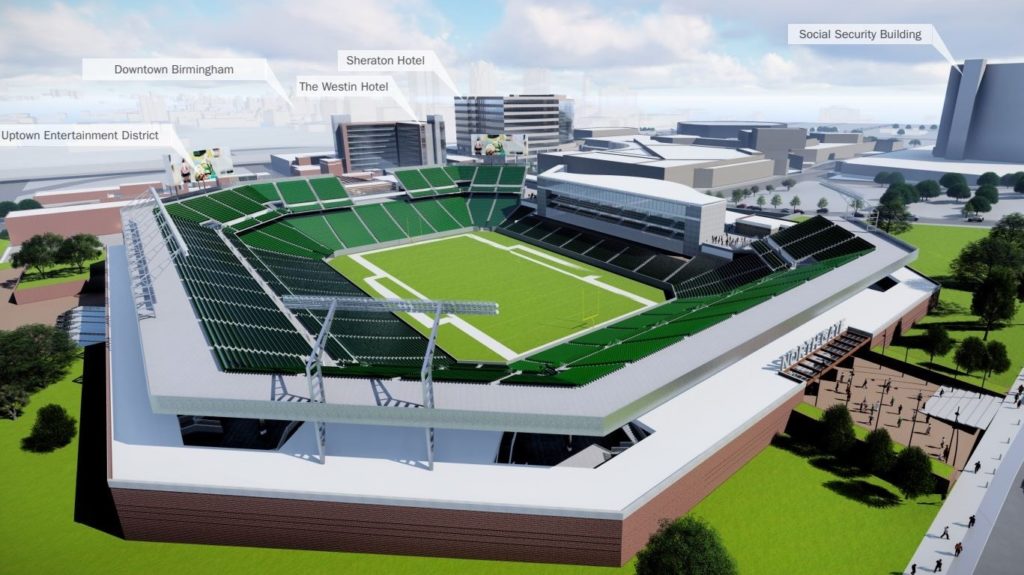
Work could begin by the end of the year on a new outdoor stadium in Birmingham. Groundbreaking is scheduled by the end of the year, and Jefferson County Commission President Jimmie Stephens tells WBMA-TV that leaders will soon finalize architectural and financial plans. Officials are trying to have the facility open in time for the UAB football season in 2021 and the World Games, an Olympics-style competition that will be held in the city that same year. The Birmingham-Jefferson Convention Complex board closed on $300 million in bonds in August. That will cover the $175 million stadium and $125 million in renovations to the existing arena. The stadium is planned downtown near the current convention complex. It will be an upgrade to 91-year-old Legion Field. Republished with permission from the Associated Press.
BJCC shares details of $123M Legacy Arena expansion and renovation
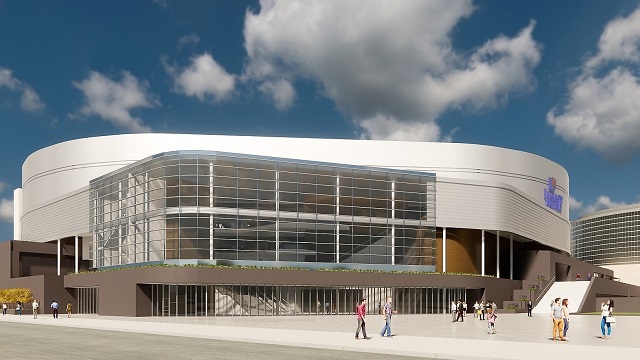
A new stadium may be the shiny element of the $300 million expansion and renovation of the Birmingham-Jefferson Convention Complex, but the substantive changes coming to Legacy Arena will position the campus for the next several decades. Before it was viewed as the “beige bunker” many see it as today, the BJCC’s arena was a state-of-the-art venue rivaled by few in the U.S. when it was built in 1976. Some of music’s biggest names played the main arena, from Elvis to Garth Brooks, Bob Dylan to Luciano Pavarotti, Led Zeppelin to Lynyrd Skynyrd, The Grateful Dead to Taylor Swift, JAY Z to ZZ Top and Prince to Celine Dion. It has hosted major sporting events, from basketball to hockey to tennis and attractions from tractor pulls to the Ringling Bros. and Barnum & Bailey Circus. The $123 million renovation and expansion of the arena will include enhancements to improve the fan experience, circulation to and within the space and modernization aimed at the kind of amenities and interactions today’s fans and customers expect. Customers aren’t just those who buy tickets to events, but the performers who have come to expect a certain level of comfort. “The experience the customer has in your building is very important,” said Tad Snider, executive director and CEO of the BJCC. “They’re going to tell others about the kind of experience they had there.” Much has changed in 42 years and while the arena has been renovated and improved in that time, there has been nothing as transformative as the work that is planned. The changes will be apparent before ever setting foot inside Legacy Arena. An added glass wall with floor space will allow for natural light within an expanded area perfect for exhibitions, showcases and other programming. The primary entrance into the arena will be reoriented to Ninth Avenue and 19th Street North. Landscaping and contrasting paint colors will make for a more aesthetically pleasing building. Inside the arena, club-level boxes and VIP suites will be one noticeable difference. Modern seating will be installed, enhancements that build on the use of smartphones and technology will be added. Improved concessions are in the plan as well as an option that could allow for delivery to individual seats. Other changes are planned for behind the scenes areas that will allow for the larger tour buses, increased number of tractor-trailers and other logistics support that comes with modern concert and entertainment productions. The courtyard that connects the arena to the concert hall and exhibition halls will also get an overhaul and all of the BJCC enhancements will complement the $174 million, 55,000-seat stadium being built nearby. Snider said plans are to have the stadium completed in time for the 2021 World Games opening ceremony and the new Legacy Arena ready in the winter of 2022. The BJCC expansion and renovations will be in conjunction with improvements to the interstate system through downtown Birmingham, specifically the enhancements to Interstate 59/20 and the CityWalk BHAM park under the elevated roadway. Along with the success of venues like the Uptown entertainment district and Topgolf, the BJCC and surrounding area will be ready for the next half -century. The NBA’s New Orleans Pelicans have already announced the arena will be home to its G League team and the stadium will be home to UAB football and the Birmingham Iron of the Alliance of American Football. Snider said the future is bright, but the new arena will include displays that give a nod to the venue’s past. “New buildings are nice, but you can’t recreate the history,” he said. Republished with permission from the Alabama NewsCenter.
Downtown Birmingham linear park the focus of upcoming public meetings
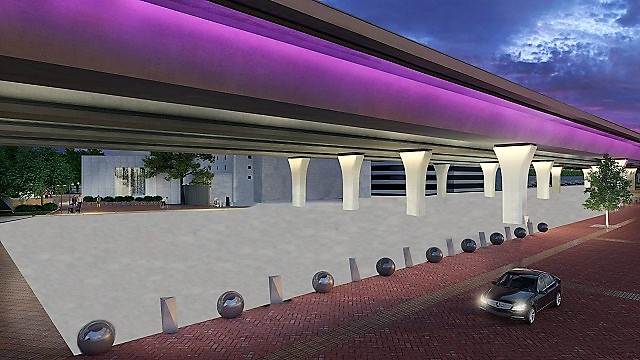
A proposal to create a mile-long linear park underneath the rebuilt Interstate 59/20 elevated highway through downtown Birmingham is generating excitement among city and community leaders. The proposal is in the conceptual stage, and is expected to be unveiled for community discussion before two meetings next month. Officials emphasize that nothing is firm and that community residents will be encouraged to provide ideas about what should go in the public space. The improvements to Interstate 59/20 will include the space underneath the roadways. (Michael Sznajderman / Alabama NewsCenter) The linear park would run for 10 blocks underneath the widened highway from 15th Street to 25th Street North – starting near the Civil Rights District and ending just beyond the Uptown entertainment district, east of the Birmingham-Jefferson Convention Complex (BJCC). In comparison, Birmingham’s popular Railroad Park, while significantly wider, is only four blocks long. State transportation officials and others participating in the process say the new public space is possible because of the way the elevated highway will be rebuilt. For example, the rebuilt interstate will have no vehicle exit or entrance ramps along the 10-block stretch, making the space below the highway more inviting for pedestrians and public activities. Enhanced lighting that can change color, similar to the 14th and 18th Street tunnels near Railroad Park, also promises to make the proposed linear park more pleasant. The new highway design removes hundreds of support columns that disrupt the space beneath the existing elevated highway. Instead of the existing spans that have columns every 65 feet, the new design will have columns 165 feet apart. The seamless design of the new highway is expected to eliminate much of the highway noise, including the “thump-thump” heard now as trucks rumble over seams between spans. The ongoing improvements to Interstate 59/20 includes 10 blocks through downtown where officials want to build a linear park and public space. (Alabama Department of Transportation) Officials said no plans are locked down for what could occupy the linear spaces underneath the new highway. Among ideas being floated are everything from a carousel, to athletic fields, to fountains and performance and event spaces. Art installations could be part of the mix. Birmingham-based Barge Design Solutions is working on the concepts. Barge has been involved in park, greenway and large landscape-design projects, including a 3-mile extension of the Tennessee Riverpark in Chattanooga, Tennessee, and the renovation of Rhodes Jordan Park in Gwinnett County, Georgia. Consulting with Barge is New York-based Biederman Redevelopment Ventures, which was part of the team responsible for important public projects around the country, including renovated Bryant Park in New York City and Klyde Warren Park in Dallas. One element already exciting to local officials and community leaders is how a linear park could provide pedestrian connections downtown – potentially linking attractions and institutions, including the BJCC, Uptown and the Sheraton and Westin hotels; the Birmingham Museum of Art, Boutwell Auditorium and Linn Park; the Alabama School of Fine Arts and its theater; and the Birmingham Civil Rights National Monument and its multiple historic sites. A linear park has the potential to be an attraction itself, providing a walkable connector between downtown and the institutions and neighborhoods just north of Interstate 59/20, which has been a physical barrier for decades. Also being discussed are potential names for the linear park. Working with Barge on branding concepts is Birmingham-based public relations firm O2 Ideas. The firm is expected to unveil a potential name for the park before the public involvement meetings, scheduled for July 17 at Boutwell Municipal Auditorium and July 24 at the Birmingham CrossPlex. There will be three sessions on both days, from 10 a.m. to noon, noon until 2 p.m., and 5 p.m. to 7 p.m. A website is being developed where details will be provided. More information is expected to be posted soon at www.dot.state.al.us. Click on “I-59 Public Space.” Republished with permission from the Alabama NewsCenter.
World Cup 2026 may yet have Birmingham presence
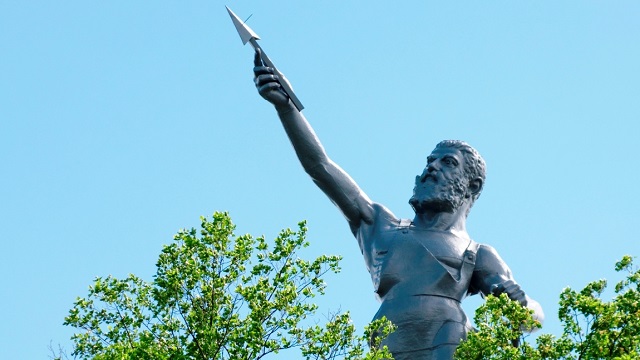
Timing is everything. And Birmingham’s timing for becoming a host city in the North American effort to secure the 2026 World Cup was awful. Wednesday, a combined bid from the United States, Mexico and Canada won the hosting rights. Sixty of the 80 matches, including the final, will be in the U.S. Last August, Birmingham was one of about 50 cities that received a bid package to become one of at least 11 U.S. venues, said Gene Hallman, president and CEO of the Bruno Event Team. “It was the worst timing,” said Hallman, who was a key player in bringing Olympic soccer to Birmingham in 1996. “Our challenge was, we had to bid Legion Field. Legion Field was not competitive.” Hallman said he called U.S. soccer officials about bidding the new stadium at the Birmingham-Jefferson Convention Complex (BJCC) as the city’s venue for games. At that time, though, funding for the stadium was not in place. “You can’t bid a hypothetical,” Hallman said. Still, Hallman said Birmingham may benefit from the winning North American bid. Atlanta “most certainly” will be one of the 11 U.S. venues, he said, and because Birmingham is close to Atlanta, the Magic City stands to gain. It helps, he said, that Birmingham has an “outstanding” relationship with U.S. Soccer. “We have a very strong possibility of being a host for a team, a country, to do all their training prior to the World Cup in Birmingham,” Hallman said. A rendering shows a stadium proposed for downtown Birmingham, near the Birmingham-Jefferson Convention Complex. (contributed) Also, Birmingham could become a medical hub for soccer players training and competing in the region to receive treatment, he said, as well as hosting large viewing parties of games that in previous cup competitions have been attended by thousands. Once the stadium at the BJCC is finished, Birmingham “will definitely be in the mix” for “friendlies,” Hallman said. “We’ll have a good five years of run-up where we can host a lot of competition prior to the World Cup,” he said. Hallman said it’s premature to talk about the potential economic impact the World Cup could have on Birmingham if the city ends up playing a prominent role. “But I can sit here and look into a crystal ball and tell you it’s going to be tens of millions of dollars, if not hundreds of millions of dollars. Because if you look at five years of potential activity at the new stadium, and given the fact that so many of the tickets that we sell to soccer events are to people who do not reside in this community, that’s a big economic impact,” he said. “That’s heads in beds and a very positive impact on the retail sector. So it will be a big economic impact and it will boost our image and reinforce our image as a very good host of international sporting competitions.” Republished with permission from the Alabama NewsCenter.
Randall Woodfin celebrates pro-football franchise coming to Birmingham
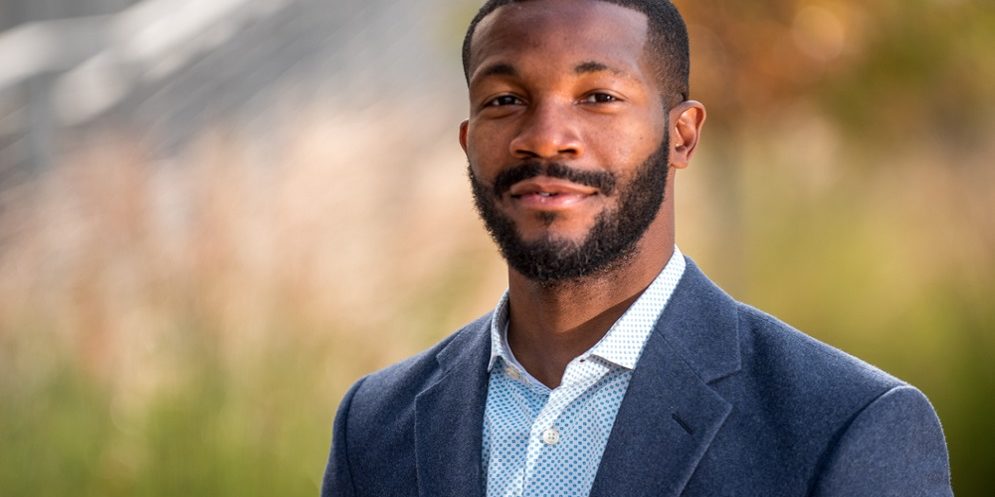
Birmingham, Ala. will soon be the new home of a new, yet-to-be-named professional football team franchise. The Alliance of American Football (AAF) announced the decision on Monday to include Birmingham as part of a new eight-team league, which will start a twelve-week season starting in February of 2019, culminating in a championship game in April of 2019. Birmingham Mayor Randall Woodfin shared his excitement over the announcement via Facebook by sharing a video of Mike Vick welcoming the city to the alliance. “Welcome to Birmingham AAF! Excited to hit the field with you! #AllianceBirmingham.,” Woodfin posted. Other teams in the league include: Atlanta, Memphis, Orlando, Phoenix, San Diego and Salt Lake City. The Birmingham team will play its first two seasons at legion field, then move to the new stadium planned for the Birmingham-Jefferson Convention Complex (BJCC), according to the Birmingham Business Journal. A head coach has not been selected for the team, but the league is expected to make further announcements later this week regarding all the details of the team. With a pro-football team coming to the city, the controversial decision made by the Birmingham City Council in March to invest $90 million over the next 30 years to renovate the BJCC and construct of a new downtown stadium, doesn’t look so terrible. However, Birmingham has experienced problems in the past, of getting professional football leagues to hold. The city has been home to several leagues over the past 20 years, and while many developed a notable fan base in the area, the teams “ultimately couldn’t overcome financial or other challenges that come with trying to compete in the shadow of the NFL and college football,” according to the Birmingham Business Journal.
Birmingham City Council approves $90M BJCC expansion
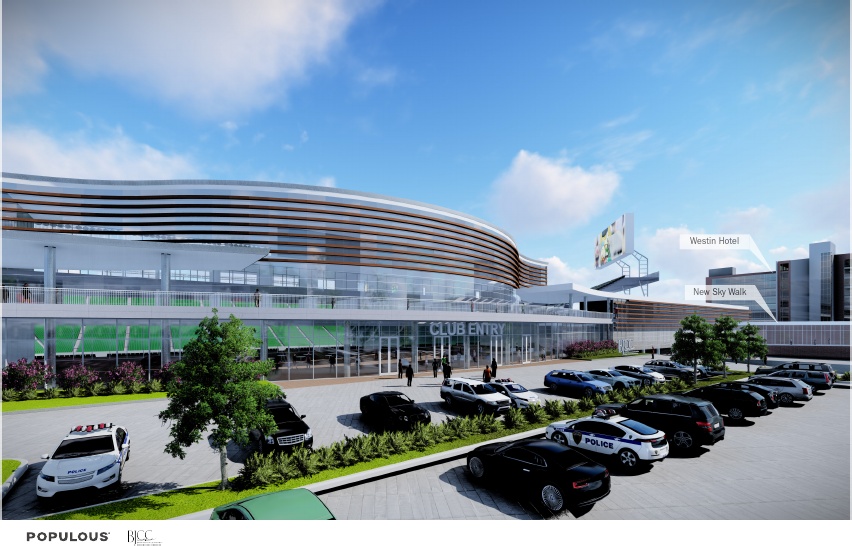
The Birmingham City Council on Tuesday approved a controversial $90 million investment over the next 30 years to renovate the Birmingham-Jefferson Convention Complex (BJCC) including construction of a new downtown stadium. After hours of public comment, councilors voted 6-3 in favor of the project. Councilors Shelia Tyson, Darrell O’Quinn and Lashunda Scales voted against the measure. The vote follows a vote in the State House last week where lawmakers approved a 3 percent tax on automobile leases and rentals in the county to help support the new stadium, renovations and expansion at the BJCC. The city will pay $3 million annually for the expansion. They will be joined by several other outside entities contributing to the expansion including Jefferson County, which will pay $1 million per year for 30 years. The BJCC Authority has also committed $10.7 million, and UAB and its corporate partners will pay $4 million for 10 years. Following the council meeting, Birmingham Mayor Randall Woodfin tweeted 100 percent of the money generated from this project will go to funding revitalization efforts for all of the city’s 99 neighborhoods. Thank you Birmingham! #PuttingPeopleFirst pic.twitter.com/r360835jFE — Randall Woodfin (@WoodfinForBham) March 27, 2018 The master plans for the renovation include: Notable items of the master plan include: An open-air stadium north of Uptown District with 45,000 fixed seats programmed to be expandable to 55,000 with a pre-designed temporary seating plan. Interviews and program requirements were conducted with stakeholders and potential users of the stadium, including the University of Alabama at Birmingham and ESPN. Legacy Arena would get a facelift, with an updated façade on the outside, new entrances, an added suite level and premium club space. The flow of the concourse will be improved and an upper level concourse added. It will also include enhanced food and beverage locations and options and improvements to the overall guest experience for sporting events, concerts and family oriented programming. The piazza outside of the arena will be renovated to feature a more open plan that will serve as a natural gathering and prefunction space encouraging activity and anchoring the pedestrial flow around the arena, concert hall and theater. Establishing a consistent and effective wayfinding experience throughout the BJCC venues to better guide attendees to their appropriate destinations and creating a stronger sense of place. The open-air stadium is expected to be the future home of UAB football games. After the council’s vote, UAB Blazers head coach Bill Clark tweeted his excitement and approval. Huge Day for Birmingham!!! Proud of great leadership who believe in where our City is headed. #WTD #GreaterBHAM — Bill Clark (@CoachBillClark) March 27, 2018 Watch live coverage (previously recorded) of the Birmingham City Council meeting:
Birmingham moves closer to new downtown stadium

The Alabama House of Representatives this week passed a Jefferson County auto lease tax to help build a downtown stadium and renovate the Birmingham Jefferson Convention Complex (BJCC). The bill imposes a 3 percent tax on automobile leases and rentals in the county to help support the new stadium, renovations and expansion at the BJCC. The bill, which had already won the Alabama Senate’s approval, passed 14-3 in the House and will now go to Gov. Kay Ivey. “The action (by) the Alabama House took us one step closer to Birmingham having state-of-the art facilities to better compete for tourism, sporting and entertainment business,” said Birmingham Mayor Randall Woodfin. “In addition, expanding and renovating the BJCC will generate millions of dollars over the next decade for the city that will go to neighborhood revitalization.” The rental tax is expected to generate about $3.5 million a year to help pay the debt service on the project, which the BJCC Authority estimates will be about $21.5 million a year. The auto lease and rental tax will not cost residents a dime because residents don’t lease vehicles to get around their own town, Woodfin said. Also, the city needs to modernize its entertainment and sports venues to compete with Atlanta, New Orleans and Nashville, which have updated facilities that Birmingham lacks, he said. State Rep. Jack Williams, R-Vestavia Hills, who sponsored the bill in the House, said passage of the legislation will lead to the renovation of the Legacy Arena at the BJCC and to the construction of a 55,000-seat outdoor stadium. “This project will create 3,700 new construction jobs in Birmingham and Jefferson County and a $130 million payroll,” he said. Renovations would allow the city to again attract NCAA tournament games that bring thousands of visitors and millions in revenue, Williams said. Woodfin agreed. “This public/private partnership between the city, county, BJCC, UAB and the corporate community will create thousands of jobs for citizens in Birmingham, and be a significant shot in the arm for our economy for decades to come,” he said. State Reps. John Rogers, Mary Moore and Juandalynn Givan, all of Birmingham, voted against the lease and rental tax. Rogers said the BJCC would benefit from the additional revenue and not the city, which city officials disputed. Money for neighborhoods In February, the Birmingham City Council voted overwhelmingly to approve a resolution of intent to provide $90 million in funding — $3 million annually for 30 years — for the construction of a multipurpose facility at the BJCC. Woodfin has argued that money from tourism could generate revenue that could be used in the neighborhoods. “There has been zero funding for street paving over the last several years. That’s a need. We have a $428 million budget and we’ve put less than $2 million in getting rid of dilapidated houses. That’s a need. Tourism is a need as well. Economic development is a need. Investing in our existing infrastructure, including the $5 million we’ve already put into the BJCC Legacy Arena, is a need. This is not an isolated topic. We’re not talking about an investment in a stadium alone. It’s an investment in the BJCC and our communities.” After taking office in November, the mayor said he needed to find money to pave the streets. “I have to find money to invest in curbs, sidewalks and lights and neighborhood revitalization. That money does not exist today. We could cut a lot of money or we could borrow money, but that’s not an idea any of us want to take. I think the return of this [new and updated entertainment and sports venues] gets us to where those things can happen. If we’re going to generate new revenue, where is that going to go? It will go toward those priorities that we don’t currently have funding for.” According to the resolution approved by the council in February, certain conditions have to be met before any money is allocated. In January, the Jefferson County Commission approved $30 million in funding for 30 years; the largest contribution will be coming from the BJCC, which will pay $10.7 million in annual debt service for 30 years. The University of Alabama at Birmingham will lease the stadium for $4 million annually for its football games. Additional funding is expected from corporate sponsors as well. The $174 million stadium is part of a $300 million master plan that includes a remodeling of the BJCC’s Legacy Arena and outside piazza. According to an independent feasibility study commissioned by the BJCC, the stadium could be completed as early as 2020, in time for the 2021 World Games, and generate roughly $5.5 million per year in tax revenue during the construction phase and as much as $9.9 million a year after construction. No specific number has been given as to how much tax revenue will be earmarked for neighborhood revitalization, but Woodfin has indicated it will be a substantial portion, if not all of it. This story originally appeared on The Birmingham Times’ website. Republished with permission from the Alabama NewsCenter.
Birmingham Business Alliance urges Alabama Legislature for policy support
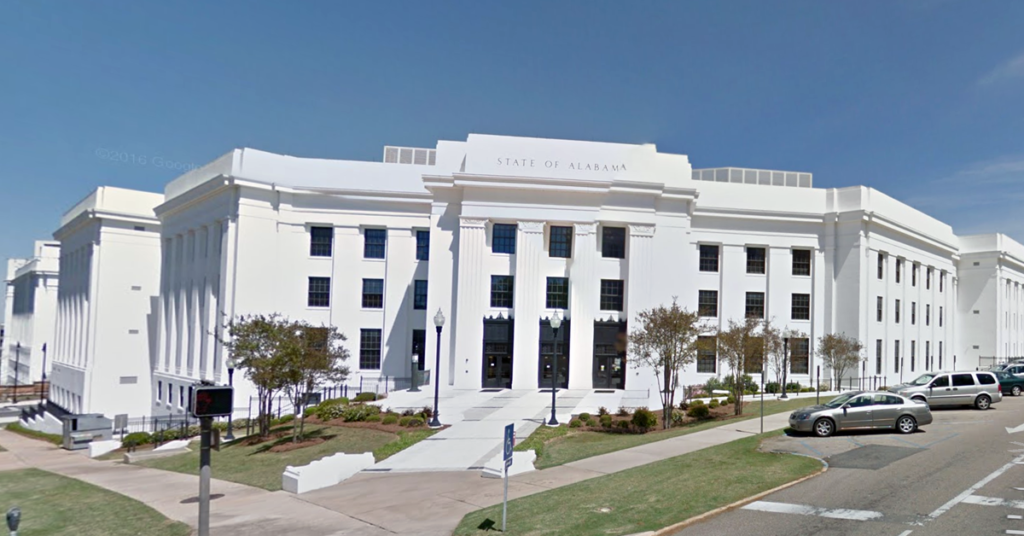
The Birmingham Business Alliance (BBA) is seeking legislative support from the Alabama Legislature. On Thursday, the group released a message urging members of the state Legislature to pass several bills to help the region grow in jobs and capital investment. “Supporting these legislative priorities and advocating for issues that put the Birmingham region in a competitive position increases our ability to attract and retain business and a quality workforce,” said CEO and president of the BBA, Brian Hilson. “We are making sure legislators statewide have the facts about each of these issues and how they can affect all communities in Alabama.” These are the issues and bills the BBA is watching closely and advocating for: The passage of a tax to add an open-air stadium to the Birmingham Jefferson Convention Complex. Already, the Jefferson County Commission has committed $30 million and the City of Birmingham has affirmed its intent to support the project. The stadium is part of the BJCC’s $300 million master plan that also includes a modernized Legacy Arena and outside renovations. A modernized BJCC and new stadium will improve our region’s ability to host large-scale conventions, trade shows, sporting and entertainment events, and draw more people here from around the country. Thousands of business professionals visit Birmingham every year by attending conferences and conventions, and their perception of our city is lasting and critical to our economic development efforts. The stadium will also have a positive impact on communities north of downtown Birmingham. The passage of The Alabama Jobs Enhancement Act (HB317), which clarifies that legitimate economic development activities do not qualify as lobbying.Passage of HB317 would eliminate any requirement for economic developers and site selection consultants to register as lobbyists, while actual lobbyists will still be required to register as lobbyists, and it will provide for more transparency of economic development incentives. Failure to pass HB317 would result in fewer economic development opportunities for Alabama and fewer jobs for our citizens. Any threat to the passage of this critical legislation puts jobs at risk, and impedes both the region’s and the state’s ability to continue to build on recent economic successes, such as the MercedesBenz facilities in Bibb County, which will create 691 jobs, and the Autocar plant in Jefferson County, which will create 746 jobs. Our competitors in other states are watching this legislation and are ready to use it to their advantage if HB317 doesn’t pass. Increased investment in infrastructure. Considering President Trump’s recently released infrastructure plan, Birmingham and Alabama must be prepared to move forward to ensure that our state does not miss out on any available funding to repair crumbling roads and to build the roads and bridges that commerce and our workforce rely on daily. Our state needs a new funding mechanism to address road and bridge construction and maintenance. We are in immediate need of additional state revenue that will address both our short- and long-term infrastructure projects. “Public policy is an important part of our work at the BBA and we will continue to advocate for legislation that supports our purpose of increasing jobs and capital investment for the region,” said senior vice president of public policy for the BBA, Waymond Jackson.


